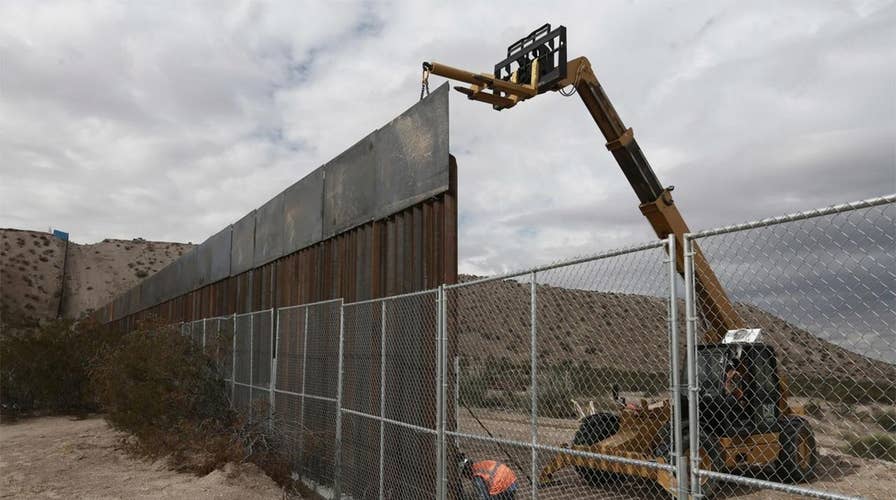Immigration and Customs Enforcement officials – faced with a lack of housing space, an agreement that limits how long they can detain families and a massive increase in the number of border crossers – are having to resort to releasing illegal immigrants and asylum seekers "out of the front door" in Arizona.
Sheriff Leon Wilmot, head of the Arizona Sheriff’s Association, told Fox News that sheriffs have been told ICE has run out of available space in its detention facilities and has not been able to keep up with the pace of people crossing the border and presenting themselves at ports of entry.
“ICE hasn’t been able to keep up with individuals coming up the border from Guatemala, Honduras and El Salvador, because they’re overwhelmed,” he said. “They’re releasing them out of the front door of their facilities.”
According to Customs and Border Protection, as of September, more than 90,000 family units have been detained in fiscal 2018 along with more than 45,000 unaccompanied minors. The Arizona Republic reported that the agency released at least 800 family members in the state last week. Activists that work with migrants told the outlet they think ICE is releasing immigrants in large numbers to create a "manufactured crisis" ahead of the November midterms.
ICE said in a statement that, starting last Monday, ICE began releasing family units from centers in Arizona without a so-called “post-release plan” -- which would normally include a transportation plan and a way to get to any relatives already in the country. Those detained are released with a notice to appear before a court hearing to adjudicate their immigration case, or in some cases paroled with supervision requirements.
ICE is limited by how long it can hold family units (FAMUs) in detention due to the 1997 Flores settlement agreement, which limits the amount of time minors can be detained to 20 days. The Trump administration is currently challenging that agreement in court after it backed down on a "zero tolerance" policy of prosecuting all who crossed the border illegally -- a policy that necessitated the separation of children from accompanying adults due to Flores.
In a statement, ICE said that individuals would normally be released only after a “post-release plan” was reviewed, including making sure they had the means to reach a final destination.
“However, due to the recent uptick in FAMUs presenting themselves along the Arizona border, ICE no longer has the capacity to conduct these reviews without risking violation of the Flores limitations on lengths of stay for families in both CBP and ICE custody,” the statement said. “To mitigate that risk, ICE began to curtail such reviews in Arizona beginning Sunday October 7.”
Wilmot told Fox News that, in the last week, a non-governmental organization has been providing housing and transportation to some migrants, but others are being left to their own devices. With 160 border crossers a day in Arizona's Yuma sector alone, he said the system is overwhelmed and Border Patrol is being tied up with housing, feeding and paying hospital bills for those injured while crossing the border.
Sen. Jon Kyl, R-Ariz., raised the question to Homeland Security Secretary Kirstjen Nielsen in a Senate hearing last week, saying he had been contacted by the Yuma mayor who had expressed concern at the mass release without review.
"The community reaches out and does a lot of this itself; but, if these reviews are not being done because the numbers are too overwhelming, then the fact is that people in Yuma are going to be threatened to some extent by an enormous number of illegal entrants into the country, and some of whom may not be making asylum claims. Some of these people may be dangerous, notwithstanding the fact that they have children with them," he said.
Nielsen said officials "spend quite a bit of time with [families] to determine where they would like to go, where their family -- if they have some -- is in the United States" when possible. But she said, "When we're not able because we don't have space or because we can't keep them in a facility long enough to have that conversation, what we do -- and, what you've seen in Yuma -- is we reach out to the NGO community and try to work with them to receive them as they come out of our care."
Nielsen said the increase in family units crossing the border between July and August was 30 percent and her department was asking Congress to pass legislation that allows families to be detained until they are deported or the asylum claim is adjudicated.
Wilmot said the crisis at the border eclipses the one that faced the Obama administration in 2015. He also warned that, while Arizona is facing the brunt of the problem, it is an issue that will affect other communities as eventually those migrants would begin moving to other parts of the country.
“Each of our communities are going to be faced with this crisis and one thing sheriffs have said is that what goes on on the border won't stay at the border, it's throughout the U.S.,” he said.
TRUMP THREATENS TO CUT AID FROM HONDURAS AS NEW MIGRANT CARAVAN NEARS US
The controversy in Arizona comes as Trump is drawing attention to the migrant crisis ahead of the midterms, and is pointing to the presence of another migrant caravan heading through Honduras and Guatemala toward the U.S. border.
Trump threatened Tuesday to cut aid to any countries assisting the caravan on its journey to the U.S.
“Hard to believe that with thousands of people from South of the Border, walking unimpeded toward our country in the form of large Caravans, that the Democrats won’t approve legislation that will allow laws for the protection of our country,” he tweeted. “Great Midterm issue for Republicans!”





